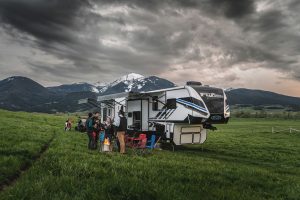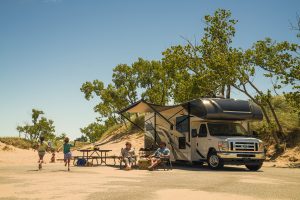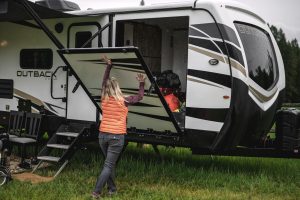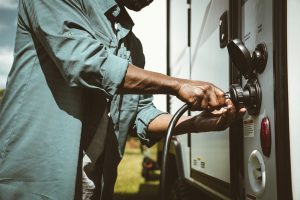
Summer is the best time to go camping, but it is also the prime season for severe weather like tornadoes, thunderstorms and hurricanes. You may plan your trip expecting clear, sunny skies but Mother Nature may have other plans.
Whether camping in the rain or amid an intense thunderstorm, you should always be prepared and have an RV emergency kit. But there are things you should do immediately before and during the storm to keep you, your loved ones and your RV safe.
Keep an eye on the forecast while RV camping

The best way you can keep yourself safe while camping is to stay alert and informed. When camping, you should get into the habit of visually monitoring the weather at all times, even if the weather is calm. If you have access to the internet or cell phone reception, it is a good idea to check the weather forecast for the entire duration of your trip. Make sure you have enabled severe weather alerts on your phone. Also, make sure you have weather apps installed on your phone so you can have easy access to the most up-to-date information. Knowing the forecast early can give you more time to plan for whatever Mother Nature sends your way. You can also purchase a weather radio to ensure you have access to the latest forecasts, even if you don’t have internet access.
How RVers can prepare for a severe weather

The hurricane season runs from June 1 to November 30 each year, right during prime camping season. If you are camping along the coast during that time, you may need to prepare for severe weather. You may likely find yourself in a tropical storm. According to the National Weather Service, a tropical storm is a cyclone that has maximum sustained surface winds ranging from 39 to 73 miles per hour. These types of storms originate over tropical or subtropical waters and can grow into a hurricane. Here are some tips for RVers who find themselves camping during a tropical storm:
- Secure your RV. Tie down or put away things like chairs, grills and other small objects that can become projectiles in high winds. Make sure your outside storage doors are closed and locked. Retract your awning and ensure it is securely fastened. Close and latch your windows. Get out your emergency preparedness kit.
- Secure your site. If your site has trees and shrubs, keep an eye out for weak branches that could break under high wind conditions. Falling branches can cause severe damage during a storm.
- Prepare the inside of your RV. Seal all important documents in waterproof bags or containers. Shut all doors and windows to help prevent water and wind from getting inside.
- Have an evacuation plan – If you decide to evacuate, leave early. Make sure your RV’s gas tank is full in the event of an evacuation. When hurricanes approach – it is never a good idea to ride out the storm in your RV. It is always best to pack your motorhome, grab your important documents and evacuate.
What RV campers need to do during a Hurricane Watch and Warning
If you are under a Hurricane Watch or Warning while RV camping, you need to take action immediately. RVs are unsafe in high winds. It is best to evacuate. Check local forecasts and weather apps to ensure you aren’t heading in the direction of the storm. Avoid driving through water as you make your way to a safe destination. Here are some additional tips for staying safe during a Hurricane Watch or Warning:
- If you need to abandon your RV, try to find a safe spot to park it. If possible, the Florida RV Trade Association (FRVTA) advises campers try to put your RV in an enclosed storage facility or try to park it next to a building. If you’re at a campsite or out in the open, choose an elevated site away from large trees and point the end of the RV that has the least amount of windows in to the wind.
- Take precautions to protect your RV. The FRVTA suggests campers empty the holding tanks and then fill all your tanks with fresh water to help add weight for holding down the RV. Turn off propane cylinders and cover the regulator. Cover the vents and air conditioning unit. Secure as many items as possible.
Tips for RV campers after a hurricane

The storm might be over, but that doesn’t mean the danger is. Just like you need to be prepared before a big storm, RV campers need to be prepared for what happens after a storm. Here are some tips to keep yourself and your loved ones safe after a hurricane hits:
- Be prepared for extended outages. Even weak or moderate tropical storms can bring down trees and power lines. The stronger the storm, the longer you are likely to be without power. Most RVs come with a generator installed, but some solely rely on hookup power. Make sure you have an after-market or portable generator in your emergency storm kit.
- Be prepared for road closures and blockages. Although city, county and state transportation officials have plans to clear major roadways quickly, it may still take a few days to get most roads open. Secondary side streets may take even longer. Never drive in flood waters.
Don’t let severe weather ruin your RV trip

Whether you are camping in the rain or find yourself in a severe weather event – the most important thing you can do is be prepared. Don’t let the risk of severe weather ruin a trip or keep you from heading into the wilderness. Check out the General RV Emergency Kit Essentials Guide to help you prepare your RV for adventure. Visit the Parts Department at your local General RV Center to pick up gear to help you prepare for severe weather. Plus, check out our great selection of towing equipment, camp kitchen gear and more! If you have any questions, our RV experts are ready to help.